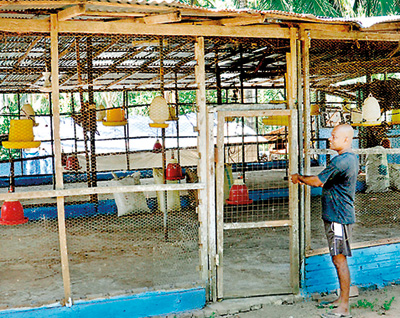Proper policy needs to be implemented for poultry feed imports, says industry expert
View(s):With the local production of poultry feed catering to only 50 per cent of the industry in Sri Lanka, the need for imports has become essential while the lack of a proper policy for the industry is an issue, according to a government specialist.

Man stands near a poultry pen
Speaking at the launch of Agrotop, a globally renowned agro-technology expertise who partnered with Brown and Company in Colombo last week, Department of Animal Production and Health, Additional Director General Dr. Aruni Thiskumara said:
“With regard to poultry feed, there has been a 42 per cent increase in compound feed prices from June 2008 to July 2015 and a price escalation in the raw material in the local and international market.
Over the years maize production had risen but it remains stagnant now due to land limitation. In the last several years imports were restricted to promote maize cultivation. Unfortunately middlemen involvement in trading and supply has created a monopolistic situation.”
On the current issues in livestock production, she said that chicken imports are restricted to safeguard local industry except for special products for special purposes. Duck and turkey in limited quantities are allowed during festive seasons to the local market.
The industry is faced with multiple issues in different subsectors which needs immediate intervention for further growth of the sector. Poultry industry monitoring and policy planning needs are in the forefront which needs to be strengthened, appropriate timely solutions have to be taken and regular industry reviews must be conducted, she noted.
According to 2014 statistics, 150,000 metric tons of chicken meat was produced and it is expected to rise to 250,000 this year. During the past three years poultry production has drastically increased.
National Livestock and Development Board Chairman Prof H.W. Cyril said, “Most poultry industries are found in the western and north western provinces and not much in other provinces. There is a very high growth in the local meat production every year.” Sri Lanka while exporting also imports meat except chicken. There is a growth in the exports but the quantity is still small while the imports have decreased according to statistics from 2005 to 2013, he added.
He said that the total meat consumed in Sri Lanka is very low compared to countries such as US, UK, New Zealand, Australia and Malaysia while it is greater than the consumption of meat in India. Agrotop International Projects Developer Benjamin Van Dijk said that heat stress is the biggest issue in poultry and most chickens die of heat.
Sri Lanka is a country where minimum ventilation is required for the chickens to survive. Tunnel ventilation is used only when the poultry house is too hot for the birds. “We are looking at the wind speed which will have a cooling effect on the birds,” said Mr. Benjamin.
Brown and Company PLC Pharmaceuticals Division General Manager Mangala Wijesinghe said that various external macro-economic factors have had an impact on live market prices for chicken while Sri Lanka’s per capita chicken consumption has increased from 5.5 kg to 7 kg per annum. “We are conscious of the food we eat and thus Agrotop’s state-of-the-art environmentally efficient poultry houses will be a bonus to Sri Lanka’s local market,” he added.


